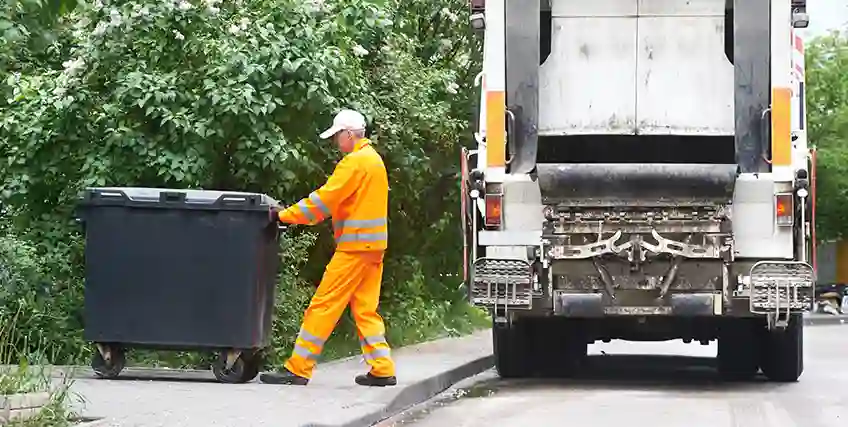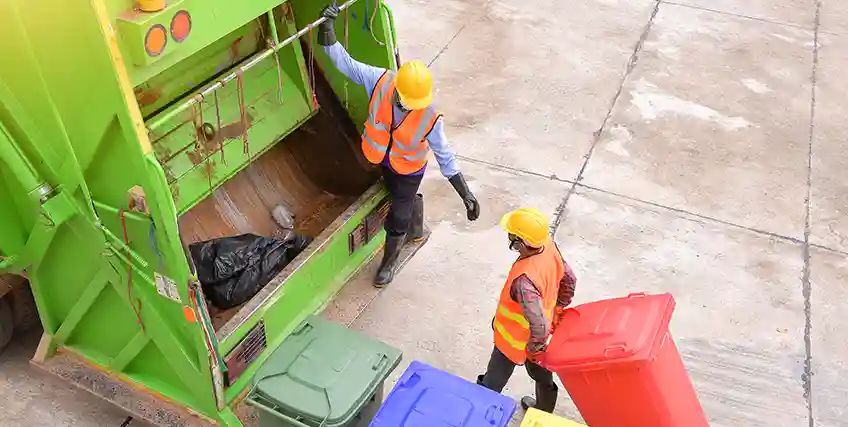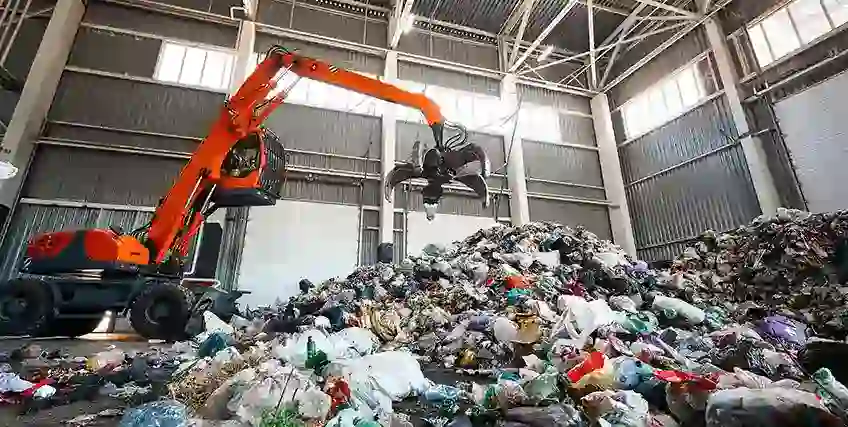Top Loan Options for Growing a Waste Collection Company in 2026
December 02, 2025 | Last Updated on: December 02, 2025

Waste collection companies in 2025 are racing to modernize, expand routes, and meet higher sustainability standards. To meet all these demands, smart waste truck financing options aren’t optional, they’re necessary.
Waste management companies in 2025 are facing new challenges and bigger opportunities to survive in the competitive market. However, to grow effectively, they need the right financial support. This helps business owners to purchase necessary machinery like dump trucks or rear loaders, bringing improved service delivery, cost savings, and competitive advantage.
Let’s dive into this article where we will explore why waste truck financing is important to today’s waste companies. We will also discuss the top loan options available and how to qualify for them with confidence.
What is the Role of Waste Collection Companies
Waste collection companies play a very important role in our livelihood. These companies ensure homes, businesses, and public spaces remain clean, safe, and compliant with environmental regulations. Every day, these waste collection companies collect tons of garbage, sort recyclables, and dispose of hazardous materials, often under tight schedules and strict local ordinances.
According to Mordor Intelligence, the U.S. waste management market is estimated at $210.31 billion in 2025 and is projected to hit $256.00 by 2030. At a growing CAGR of 4.01%, this surge is being driven by rapid urbanization, tightening environmental regulations, and a stronger push for sustainable practices.
To meet this rising demand, waste collection companies need to take action. These companies are responsible for collecting, transporting, and disposing of both residential and commercial waste. Their efforts directly support public health and environmental goals across growing urban centers.
To perform all these activities, waste management companies rely on vehicles such as rear loaders, grapple trucks, sweepers, and vacuum trucks. These trucks allow companies to handle diverse types of waste and fulfill service contracts efficiently.
Therefore, waste truck financing is essential to invest in fleet upgrades, replace outdated or used equipment, and improve waste management operations. This allows waste management companies to maintain reliability and boost operational efficiency.
Why Waste Truck Financing is Important for Companies
To run the operations smoothly, waste collection companies need to upgrade or replace waste equipment which can be a major cost. Machinery like a new hook lift, roll-off truck, or flatbed can cost over $250,000. However, small businesses can’t afford to pay this amount up front.
To tackle this situation, waste truck financing plays a major role. The different loan options help waste management companies stay operational and competitive while protecting their cash flow. Additionally, companies can easily preserve their working capital for other uses like unexpected emergencies or payroll.
With the right waste truck financing option, you can:
- Purchase new equipment or used equipment that fits your route size.
- Expand your fleet with semi-trucks, dump trucks, or front loaders.
- Improve routing logistics without risking your working capital.
- Access warranties and maintenance plans through selective lenders.
Hence, financing options like garbage truck financing or vehicle financing let you grow your business while maintaining financial stability.
Top Waste Truck Financing Options for Waste Collection Companies
Waste collection companies might need financing programs to upgrade equipment or flexible credit access to support large-scale and everyday operational needs. However, each financing option serves a different purpose, depending on the kind of waste vehicles, tools, or infrastructure your company needs to invest in.
Also, there are many financing specialists in today’s market who focus exclusively on the waste industry. This helps companies in getting custom quotes, faster service, and fewer rejections. Here are some top waste truck financing options for waste collection companies.
Equipment Financing
Equipment financing is a waste truck financing option that can be used to purchase physical assets like machinery or vehicles. Here the equipment itself acts as collateral, which makes the loan more accessible for businesses without strong credit histories.
Waste collection companies can use equipment financing to purchase heavy gear like compactors, hook lifts, or sweepers without large upfront costs. This financing option allows them to upgrade equipment, meet evolving service demands, and preserve cash flow for day-to-day operations.
Commercial Truck Financing
The commercial truck financing option supports the purchase of work-specific vehicles like garbage trucks, rear loaders, front loaders, and more. This loan typically covers the cost of the truck while offering flexible repayment terms and possible warranties.
Waste collection companies can use commercial truck financing to expand or replace aging fleets. This waste truck financing option can help companies acquire vacuum trucks or upgrade roll-off trucks and fulfill contracts, expand services, and reduce vehicle downtime.
SBA Loans
SBA loans are backed by the U.S. Small Business Administration. The most popular SBA loan programs include the SBA 7(a) and SBA 504 loan programs. These loans are the most preferred options by businesses due to their lower interest rate and longer repayment terms. However, these come with stricter eligibility criteria and demand a good credit score.
The SBA 504 loan program can be used for fixed assets like land or heavy equipment, while the SBA 7(a) loan program is ideal for working capital or refinancing.
Waste collection companies can use SBA loans to plan major expansions or facility upgrades. This waste truck financing option can help fund grapple truck purchases, build a new processing site, or invest in recycling equipment financing.
Business Line of Credit
A business line of credit is a revolving loan that allows companies to access funds when needed up to a predetermined limit. This waste truck financing option works exactly like credit cards, where interest is paid only on the amount drawn.
A business line of credit can be used by waste collection companies to handle emergencies like breakdowns, unexpected labor costs, or seasonal slowdowns. This flexible loan option allows continuity without disrupting long-term financial plans.
Term Loans
Term loans offer a lump sum of money to borrowers that can be repaid over a fixed period of time. These loans come with a fixed interest rate and a fixed term, ideal for projects that have clear goals and timelines.
Waste collection companies can consider term loans as a waste truck financing option for buying land, launching a new fleet, or entering a new service area. This financing option comes with predictable monthly payments that simplify budgeting and make it easier to manage multiple growth initiatives at once.
Alternative Lenders and Online Financing
Alternative lenders do offer fast, digital-first financing with relaxed credit requirements. These usually provide funding for trailer financing, waste equipment financing, or used equipment with fast approvals and less paperwork.
Online loan options are useful, especially for startups or small waste companies that need funds to act quickly. Whether it’s filling a last-minute fleet gap or funding a sudden expansion, these lenders give businesses access to capital that might otherwise be out of reach.
How to Qualify for Waste Truck Financing
Getting approved for waste truck financing requires a mix of solid planning and organized documentation. Additionally, lenders need assurance that your business is financially stable and ready to manage the responsibility of repayment.
Below are some important areas you should focus on to improve your chances of approval.
Maintain a Strong Credit Score
A strong credit score is often the first thing lenders evaluate. Most lenders prefer a score of 680 or higher to offer competitive interest rates. A higher score signals lower risk, which means better interest rates and more favorable loan terms. Also, before applying, it’s wise to check your credit report and resolve any discrepancies that might lower your score.
Show Positive Cash Flow
Having a stable cash flow proves your business can support ongoing monthly payments. Lenders typically ask for recent bank statements between 6 to 12 months to assess your financial health. If your income consistently exceeds expenses, it builds confidence in your ability to repay the loan on time.
Prepare Business Documentation
Detailed documentation streamlines the application process and reduces approval delays. Most lenders will request tax returns, profit and loss statements, business licenses, and quotes for new equipment or garbage trucks. However, keeping this information organized can fast-track your application and highlight your readiness.
Partner with a Specialized Lender
Not all lenders understand the unique needs of waste management companies. Working with a financing company or financing specialist familiar with the waste industry can make a big difference. They can suggest relevant financing solutions, understand seasonal revenue patterns, and guide you to the most suitable loan structure for your fleet size and service scope.
Consider Pre-Approval
Getting pre-approved offers a snapshot of how much financing you qualify for before you commit to a purchase. It strengthens your position when negotiating with sellers and helps you narrow down financing programs that align with your budget. Plus, pre-approval can make the formal loan process faster and smoother.
Conclusion
The future of the waste management business depends on strong infrastructure and efficient operations. But real growth requires smart financial planning. With the right waste truck financing options, you can add roll-off trucks, replace aging rear loaders, or expand your recycling capacity.
Therefore, evaluate your business needs, check your credit score, and connect with a trusted lender. Ask about warranties, loan flexibility, and repayment terms. Additionally, work with a financing company that understands the waste industry and offers proven financing solutions.
The right loan will help you acquire new equipment, use recycling equipment financing, or vehicle financing programs to stay compliant and efficient.
Use your funding options wisely. Take the next step to improve waste management in your community and for your business.
Frequently Asked Questions About Waste Truck Financing
How does waste truck financing help with business growth?
Waste truck financing can help you expand your fleet without draining your working capital. As a result, you maintain day-to-day operations while investing in new vehicles. Over time, this can contribute to greater efficiency and larger service coverage.
Can startups in the waste industry apply for financing?
Startups might face more hurdles, but they often have options through online or alternative lenders. Since these platforms usually offer quicker approvals and lighter documentation, they’re more accessible. However, preparing your business plan and financials can make a big difference.
What documents do I need when applying for financing?
You’ll usually need your business license, tax returns, bank statements, and quotes for the equipment or vehicles. Some lenders may ask for more, while others keep the process minimal. That’s why organizing your paperwork early can really help.
How do I know which loan suits my business needs best?
Take a look at your goals like fleet expansion, working capital, or new technology while considering different loan options. Then, compare loan terms, interest rates, and repayment flexibility across lenders. Moreover, consulting with a financing company can also give you personalized guidance.
Are SBA loans a good fit for waste management businesses?
SBA loans may work well for businesses planning long-term growth or large purchases. Since they typically offer lower interest rates and longer terms, many find them appealing. However, the application process might take longer than other options.




